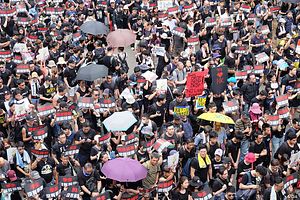A deadline imposed by activist groups for Hong Kong’s government to scrap highly unpopular extradition bills and accept other demands passed Thursday without an official response.
The groups have said they will call on supporters to surround government headquarters if their demands aren’t met, continuing demonstrations in which hundreds of thousands have taken to the streets in the past weeks.
The number of protesters outside the Legislative Council, which had dwindled since a massive march last Sunday, began picking up again Thursday afternoon. With no response from the government, protests were slated to begin Friday morning and many people appeared prepared to spend the night at the central government complex.
The government announced that the complex would be closed Friday “due to security considerations.”
Hong Kong Chief Executive Carrie Lam has apologized for her handling of the extradition bill, which could be used to send suspects to mainland China for trial. But she has stopped short of scrapping the legislation, which critics say threatens the territory’s judicial independence, prompting the largest and angriest protests in the semi-autonomous Chinese territory in years.
Other demands by activist groups include investigating police tactics used against the protesters, cease calling the protests a riot, and releasing those arrested and dropping charges against them. Many have also called on Lam to resign, including Joshua Wong, the student leader of the 2014 “Umbrella Movement” pro-democracy protests.
Another group, the Civil Human Rights Front, which organized marches on the past two Sundays, has called for another protest on July 1, the anniversary of Hong Kong’s handover from British to Chinese rule in 1997.
No one group or personality has emerged to lead the protest movement, which taps into deep resentment among the young and middle class over the dominance of a moneyed elite over Hong Kong’s economy and political institutions. That may be deliberate, as previous high-profile protest leaders have faced prosecution and even jail time.
Instead, a broad coalition of trade unions, church groups, political parties, civic groups, and veteran activists has mobilized their members, galvanized further by what was widely seen as heavy-handed police tactics.
Following last Wednesday’s violence, police adopted a more relaxed approach, hoping to avoid a replay of the events of September 2014, when officers unleashed 87 rounds of tear gas at protesters who had amassed in the same location as the current protests.
They temporarily forced the protesters off the roads they had occupied, but after the smoke dissipated, bigger crowds returned, angrier than before, and didn’t leave for nearly three months.
Opponents of the extradition bill, who also include legal and business groups, say it puts critics of China’s ruling Communist Party at risk of torture and unfair trials in the mainland and further chips away at the “one country, two systems” framework under which Hong Kong has been governed since 1997.
That guaranteed the territory the right to retain its own legal, economic, and political system for 50 years, but the Communist Party under Chinese President Xi Jinping has been pushing ever-more aggressively to quiet independent voices in Hong Kong. Beijing has squelched all reporting on the protests in mainland media and accused foreign forces of stirring up disturbances in Hong Kong.
Lam formally apologized Tuesday and said she was responsible for the extradition bill mess. The fact that she did not bow in apology was front-page news, with many in Hong Kong criticizing what they said was an apparent lack of contrition.
Lam has insisted the legislation is needed for Hong Kong to uphold justice and not become a magnet for fugitives. It would expand the scope of criminal suspect transfers to include mainland China, Taiwan, and Macau.
By the Associated Press, with additional reporting by The Diplomat.

































